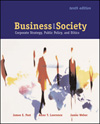

 Business and Society: Corporate Strategy, Public Policy, Ethics, 10/e Antitrust, Mergers, and Global Competition Chapter ObjectivesAll societies face the problem of deciding how much power should be held by leading enterprises. In the United States, antitrust laws have long been used to curb corporate power, to preserve competition, and to protect consumers. The rapid advance of technology and the globalization of the economy, however, have raised new issues concerning business competitiveness. These trends have presented public policymakers and corporate leaders with a need to reconcile corporate power, stakeholder interests, and social responsibility with new realities. This chapter focuses on these key questions and objectives:
|

 2002 McGraw-Hill Higher Education
2002 McGraw-Hill Higher EducationAny use is subject to the Terms of Use and Privacy Policy.
McGraw-Hill Higher Education is one of the many fine businesses of The McGraw-Hill Companies.